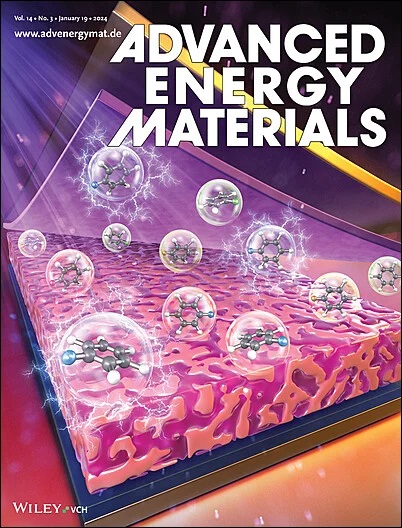Advances in Interfacial Electrostatic Energy Harvesting via Direct Current Triboelectric Nanogenerators
IF 26
1区 材料科学
Q1 CHEMISTRY, PHYSICAL
引用次数: 0
Abstract
Interfacial electrostatic energy, widely presents in natural and artificial environments, has long been regarded as a hazardous and uncontrollable energy form due to its erratic discharge behavior. The advent of direct current triboelectric nanogenerators (DC‐TENGs) has opened new approaches for effectively harvesting electrostatic energy during electrostatic discharges and generating unidirectional current outputs without external rectifiers. Compared with conventional alternating current TENGs, DC‐TENGs offer simplified circuit design, and better adaptability for directly driving electronic devices. This review provides a comprehensive summary of the fundamental mechanisms of DC‐TENGs, including air breakdown‐based charge transfer and structural innovations that enable continuous DC output. The key factors affecting performance are systematically analyzed, such as material selection, structural configuration, and environmental conditions, along with recent strategies for performance enhancement. Furthermore, the versatility of DC‐TENGs is highlighted through their wide‐ranging applications in high‐voltage power generation, micro/nano energy sources, wearable electronics, self‐powered sensors, and ocean wave energy harvesting. This review concludes with perspectives on future research directions and practical deployment, emphasizing the potential of DC‐TENGs in enabling sustainable, distributed energy systems for smart environments and next‐generation electronics.直流摩擦纳米发电机界面静电能量收集的研究进展
界面静电能广泛存在于自然和人工环境中,由于其放电行为不稳定,一直被认为是一种危险的、不可控的能量形式。直流摩擦纳米发电机(DC - teng)的出现为在静电放电过程中有效地收集静电能量和在没有外部整流器的情况下产生单向电流输出开辟了新的途径。与传统的交流teng相比,DC - teng简化了电路设计,并具有更好的直接驱动电子器件的适应性。本文综述了DC - teng的基本机制,包括基于空气击穿的电荷转移和实现连续直流输出的结构创新。系统地分析了影响性能的关键因素,如材料选择、结构配置和环境条件,以及最近的性能增强策略。此外,DC - teng的多功能性通过其在高压发电、微/纳米能源、可穿戴电子产品、自供电传感器和海浪能量收集方面的广泛应用而得到强调。本文最后展望了未来的研究方向和实际应用,强调了DC - teng在实现智能环境和下一代电子产品的可持续分布式能源系统方面的潜力。
本文章由计算机程序翻译,如有差异,请以英文原文为准。
求助全文
约1分钟内获得全文
求助全文
来源期刊

Advanced Energy Materials
CHEMISTRY, PHYSICAL-ENERGY & FUELS
CiteScore
41.90
自引率
4.00%
发文量
889
审稿时长
1.4 months
期刊介绍:
Established in 2011, Advanced Energy Materials is an international, interdisciplinary, English-language journal that focuses on materials used in energy harvesting, conversion, and storage. It is regarded as a top-quality journal alongside Advanced Materials, Advanced Functional Materials, and Small.
With a 2022 Impact Factor of 27.8, Advanced Energy Materials is considered a prime source for the best energy-related research. The journal covers a wide range of topics in energy-related research, including organic and inorganic photovoltaics, batteries and supercapacitors, fuel cells, hydrogen generation and storage, thermoelectrics, water splitting and photocatalysis, solar fuels and thermosolar power, magnetocalorics, and piezoelectronics.
The readership of Advanced Energy Materials includes materials scientists, chemists, physicists, and engineers in both academia and industry. The journal is indexed in various databases and collections, such as Advanced Technologies & Aerospace Database, FIZ Karlsruhe, INSPEC (IET), Science Citation Index Expanded, Technology Collection, and Web of Science, among others.
 求助内容:
求助内容: 应助结果提醒方式:
应助结果提醒方式:


